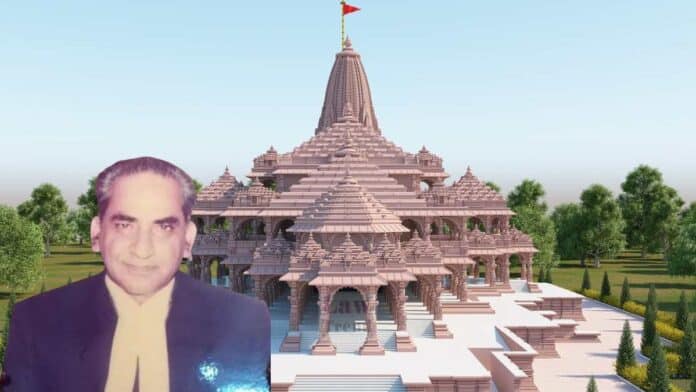On January 22, 2024 consecration ceremony (Pran Pratishtha) of Lord Ram will be held in Ayodhya. This day has come after a very long legal battle from District Court to Supreme Court.
On this Historic Occasion, Law Trend brings for its readers a Series of Articles focussing on important and historical milestones of this Legal Journey of Ram Janmabhoomi Temple.
Judge Who Opened the Door of Babri and Consequences Faced by Him

In the ancient city of Ayodhya, the majestic Ram Mandir stands as a testament to the profound sacrifices and relentless struggles of countless souls. Among these is Justice Krishna Mohan Pandey, whose pivotal decision to permit Hindus to worship at a then-contested sanctuary marked the beginning of a tumultuous chapter in his life.
This ruling, monumental in its impact, made him a target of dire threats originating from across the border in Pakistan. But adversity wasn’t confined to foreign shores; he encountered it in his homeland too. The prevailing state administration took a stance that seemed like an act of retribution, stalling his promotion. Fighting for justice in his personal sphere, Justice Pandey had to embark on a legal battle for a well-deserved promotion.
Two years after the verdict, the Uttar Pradesh Government had sent a list of fifteen esteemed judges to the central Govt, each name accompanied by an annotation from the Chief Minister himself. Among these was Justice Pandey, whose reputation and achievements had earned him the Chief Justice of India’s endorsement, placing him firmly among the seven judges deemed worthy of elevation.
However, in a twist of bureaucratic labyrinth, the central Govt, tasked with final approvals, sanctioned only six of the seven names endorsed by the Chief Justice, conspicuously omitting Justice Pandey from their list of appointees. This exclusion painted a stark contrast when Junior Judge RK Agarwal, trailing behind Justice Pandey in experience and seniority, found his way to a promotion to the High Court.
But the repercussions of his decision rippled further, touching his family in deeply unsettling ways. His daughter, in the sanctity of her classroom, found herself the target of harassment, an ordeal stemming from her father’s ruling and influenced by the biases of a particular community. This aspect of their story, often overshadowed and untold, adds a poignant layer to the narrative of sacrifice that surrounds the Bhavya Ram Mandir.
The Order
On a defining day, February 1st, 1986, Justice Krishna Mohan Pandey made a decision that would etch his name in history. His verdict, allowing Hindus to worship at a long-disputed site, became a cornerstone in the saga leading to the construction of the illustrious Bhavya Ram Mandir in Ayodhya.
Faizabad District Judge KM Pandey ordered the Babri Masjid be unlocked. He observed, “[…] Muslims are not going to be affected by any stretch of imagination if the locks of the gates are opened and idols inside the premises are allowed to be seen and worshipped by pilgrims and devotees. Heavens will not fall if the locks of the gates are removed”.
Upon his appointment as the District Judge of Ayodhya (then Faizabad), Justice Pandey inherited a tapestry of ancient disputes, including the 40-year-old Ram Mandir case. With a resolve as steadfast as the pillars of justice, he dedicated three to four months immersing himself in historical gazetteers and sifting through layers of evidence. His quest for truth led him to a simple yet profound conclusion: there was no justifiable reason for the site’s locks to remain closed. His landmark decision on that fateful February day to unlock the gates stood unchallenged by higher courts, a testament to its legal soundness.
Divine Monkey
In his riveting book on Ayodhya, author Hemant Sharma weaves a narrative that brings to life the events he witnessed firsthand. Among the vivid tales and historical recountings, one chapter titled ‘Ram Lalla Ki Tala Mukti’ stands out with its blend of the mystical and the mundane. Sharma delves into a curious incident described by Krishna Mohan Pandey, the District Judge of Faizabad at the time, in his 1991 autobiography.
On the day Judge Pandey penned the historic order to unlock the gates of the temple, he encountered an extraordinary vision – Bajrang Bali, the mighty deity, manifested in the form of a solemn black monkey. Perched atop the courthouse roof, gripping the flag post, this silent sentinel observed the unfolding drama below. Despite offerings of gram and peanuts from those gathered to witness the verdict, the monkey remained steadfastly uninterested in the treats, its gaze fixed on the crowd below, only departing after the judge’s orders were given. Later, to Judge Pandey’s astonishment, he found the same monkey waiting in the verandah of his home, a moment he interpreted as a divine sign, which he greeted with a respectful salute.
In his autobiography “Voice of Conscience” written in 1991, Justice Pandey wrote:
“On the date of the order when orders for opening locks was passed a Black Monkey was sitting for the whole day on the roof of the Court Room in which hearing was going on, holding the flag-post. Thousands of people from Faizabad and Ayodhya who were present to hear the Court’s final orders offered him groundnuts and various fruits. Strangely, the said Monkey did not touch any of the offerings and left the place when the final order was passed at 4.40 pm. The District Magistrate and SSP escorted me to my bungalow. The said Monkey was present in the verandah of my bungalow. I was surprised to see him. I just saluted him, treating him to be some Divine Power.
Author:
Rajat Rajan Singh
Advocate at Allahabad High Court, Lucknow
Editor-in-Chief at Law Trend







